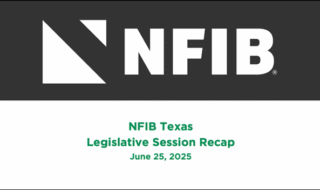March 8, 2025
NFIB State Director Michael Iosua reports from the State Capitol
[A printable version of this story can be found here]
March 12th is the midway point for the Hawaii State Legislature’s 2025 Regular Session. Yay! The First Crossover Deadline was March 6th, marking the last day in which bills can pass three readings and emerge from the originating chamber, then cross over to the non-originating chamber. Bills that do not meet the three-reading requirement in the originating chamber by the First Crossover Deadline will not proceed through further discussions during the 2025 regular legislation session.
In furtherance of NFIB Hawaii’s policy priorities, the legislative team has worked with committee chairs and other members of the Hawaii State Legislature to prevent many harmful legislative bills from continuing in the process. The team has been successful in having many of the harmful bills either deferred or otherwise defeated for this session. Below is a summary of the status of NFIB Hawaii’s priority bills.
Dead Bills
HB 149—Relating to Corporations
Requires domestic and foreign corporations to provide their shareholders with reports of independent expenditures and political contributions. The JHA committee deferred this bill.
HB 158/HB 722—Relating to Unemployment Benefits
Allows striking workers to be eligible for unemployment benefits. HB 158 failed to meet the crossover deadline; HB 722 was not scheduled for hearing.
HB 168/HB 425/SB 159—Relating to Public Employment
Establishes a paid family leave program for state and county employees. Authorizes a qualifying employee to take up to 12 weeks of paid leave for the birth or placement of a child or to care for a family member who has a serious health condition. Requires the employee to agree to subsequently work for the employer for at least 12 weeks upon return to service except under certain conditions. HB 425 was deferred by the LAB committee; HB 168 and SB 159 were not scheduled for hearing.
HB 219—Relating to Family Leave
Provides state and county employees with five days of paid family leave each calendar year. This bill was not scheduled for hearing.
HB 274—Relating to Subcontractors
Requires a contractor to pay a subcontractor within 30 days of receiving an invoice for services rendered. Provides penalties for delayed or withheld payments. This bill was deferred by the LBT committee.
HB 425—Relating to Public Employment
Establishes a paid family leave program for state and county employees. Authorizes a qualifying employee to take up to 12 weeks of paid leave for the birth or placement of a child or to care for a family member who has a serious health condition. Requires the employee to agree to subsequently work for the employer for at least 12 weeks upon return to service except under certain conditions. The LAB committee deferred HB 425.
HB 555/SB 638—Relating to Employment Practices
Requires employers to authorize and permit employees a 10-minute paid rest period for every four hours worked. The bill did not make the crossover deadline.
HB 597—PROPOSING AN AMENDMENT TO ARTICLE I OF THE CONSTITUTION OF THE STATE OF HAWAII TO RECOGNIZE AND PROTECT THE INHERENT AND INALIENABLE RIGHT OF ALL PEOPLE TO CLEAN WATER AND AIR, A HEALTHFUL ENVIRONMENT AND CLIMATE, HEALTHY NATIVE ECOSYSTEMS, AND BEACHES
Proposes a constitutional amendment to ensure clean water and air, a healthful environment and climate, healthy native ecosystems, and beaches, shall be protected and shall not be infringed. The bill was not scheduled for hearing.
HB 755/SB 852—Relating to Paid Family Leave
Requires the Department of Labor and Industrial Relations to establish a family and medical leave insurance program and begin collecting payroll contributions to finance payment of benefits. By 1/1/2029, requires the Department to start receiving claims and paying benefits under the program. Specifies eligibility requirements and employee protections under the program. HB 755 did not make the crossover deadline; SB 852 was not scheduled for hearing.
SB 358—Relating to Fair Scheduling
Requires employers to provide employees with written notice of the employee’s shift schedule at least ten calendar days before the employee is scheduled to work, under certain circumstances. Requires certain employers to pay their employees twice as much as their regular rate of pay for time worked when their shift schedule was not timely given . SB 358 was not scheduled for hearing
SB 718—Relating to Equity
Requires all places of public accommodation and public entity constructions constructed after July 31, 2026, to provide universal changing accommodations that are equally accessible regardless of gender. The bill was not scheduled for hearing.
Live Bills
HB 1146/SB 1465—Relating to Pass Through Entity Taxation
For taxable years beginning after 12/31/2024, requires all qualified members claiming a credit for passthrough entity taxation to adjust their income to include the qualified member’s share of taxes paid by an electing pass-through entity. Both bills crossed over to the non-originating chambers.
HB 1405—Relating to Permits
Establishes specific deadlines within the facilitated application process to obtain a permit and requires the Department of Business, Economic Development, and Tourism to establish certain resources and processes to help streamline permit applications. Establishes and appropriates funds for positions within the Department of Business, Economic Development, and Tourism. HB 1405 crossed over to the Senate and is scheduled for hearing with EDT committee.
HB 1406—Relating to Government Procedures
Establishes the Intergovernmental Task Force for Permit Simplification to identify actions taken, challenges encountered, and legislative measures necessary to facilitate, expedite, and coordinate state and intergovernmental development permit processes. HB 1406 crossed over to the Senate and is scheduled for hearing with EIG committee.
SB 1038—Relating to Privacy
Adds definitions of “identifier” and “specified data element” and amends the definition of “personal information” for the purposes of notifying affected persons of data and security breaches under existing state law that governs the security breach of personal information. Includes licensees subject to the Insurance Data Security Law among the businesses deemed compliant with security breach notice requirements under existing state law. This bill crossed over to the House and was referred to the ECD, CPC committees.
SB 1493—Relating to Service Animals
Requires sellers or providers of emotional support animals, as well as those issuing verifications of a disability related need for an emotional support animal, to provide written notice to the buyer or recipient containing certain information. Requires persons or businesses that sell or provide certificates, vests, or identification tags that identify an animal as an emotional support animal to provide written notice to the buyer or recipient containing certain information. SB 1493 crossed over to the House and was referred to the CPC, JHA committees
NFIB is a member-driven organization advocating on behalf of small and independent businesses nationwide.
Related Articles














